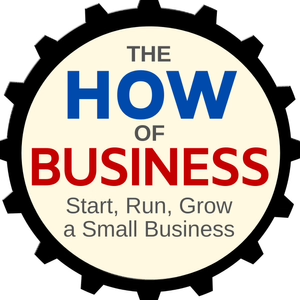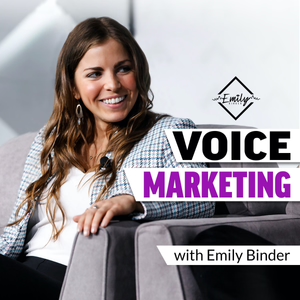
Social Media Influencer Agreements
04/21/20 • 35 min
Startup LAWnchpad is the podcast that educates entrepreneurs about forming, growing and protecting a startup. Startup LAWnchpad is produced by the Entrepreneurial Law Clinic at Fordham University School of Law in New York City.
Episode Description: Tommine McCarthy (Fordham Law ‘20) and Shirley Ureña (Fordham Law ‘20) interview Hannah Taylor, Partner at Frankfurt Kurnit Klein & Selz, about social media influencer agreements in which a brand enters into a contract with an influencer to create content that promotes a brand on social media. The discussion includes details about exclusivity, termination, specificity, and ownership of influencer content.
Episode Roadmap:- [:30] Tommine McCarthy (Fordham Law ‘20) and Shirley Ureña (Fordham Law ‘20) define social media influencer agreements and welcome Hannah Taylor.
- [2:52] Understanding the advantages and disadvantages of utilizing social media influencers.
- [6:55] Does the liability for non-compliance lie with the brand owner or the influencer?
- [8:53] Understanding the level of influence and substantiation the brand is allowed to have on the influencer's opinion of a product or experience.
- [12:13] An overview of the scope of work and content provided by the influencer, including approval rights, visibility, and ownership.
- [17:25] Is it typical for a brand to ask for influencer exclusivity, and how does non-compete law factor into this?
- [19:15] Contests, sweepstakes and promotion law factors for influencers.
- [23:18] Common compensation structures for paid posts and the benefits of being a micro-influencer.
- [26:02] Highly negotiated terms in an influencer contract include exclusivity, termination, morals, and money.
- [29:20] Common mistakes brands make when entering into influencer agreements such as not including specific content and monitoring policy requirements.
- [32:15] Recommendations for new entrepreneurs’ monitoring programs and why specificity always wins.
- “The FTC can go after whomever they want to go after. It’s the FTC’s job to make sure that consumers are not deceived.” — Hannah Taylor
- “Some guidance from a brand about what a product does and appropriate ways to speak about the product is always a good idea.” — Hannah Taylor
- “The main advertising rules from the FTC are don’t lie and don’t be unfair. Pretty simple, but the ways in which they think things are deceptive, lying, or unfair are pretty nuanced, depending on the way people communicate.” — Hannah Taylor
- “It’s not only money that can constitute a material connection between a company and an influencer. It’s anything of value or anything that could bias somebody....including free products.” — Hannah Taylor
- Fordham’s Entrepreneurial Law Clinic
- Follow us on Twitter @FordhamELC
Disclaimer:
The information contained in the Startup LAWnchpad podcast and any materials associated therewith (the “Podcast”) is for educational, informational, and entertainment purposes only. It does not constitute legal advice or tax advice with respect to any particular circumstance. The Podcast is not a complete overview or analysis of the topics presented, and may contain information that varies in different jurisdictions and is subject to revision, interpretation, or nullification after the date of recording. The transmission of information to you does not create a lawyer-client relationship between you and any host, guest, or their respective employer, including but not limited to Fordham University School of Law and Lincoln Square Legal Services, Inc. None of these parties shall be liable for any loss that may arise from any reliance on the Podcast. You should not rely upon the Podcast or treat it as a substitute for legal advice. You should consult a lawyer familiar with your particular circumstances and licensed in your jurisdiction for legal advice.
Startup LAWnchpad is the podcast that educates entrepreneurs about forming, growing and protecting a startup. Startup LAWnchpad is produced by the Entrepreneurial Law Clinic at Fordham University School of Law in New York City.
Episode Description: Tommine McCarthy (Fordham Law ‘20) and Shirley Ureña (Fordham Law ‘20) interview Hannah Taylor, Partner at Frankfurt Kurnit Klein & Selz, about social media influencer agreements in which a brand enters into a contract with an influencer to create content that promotes a brand on social media. The discussion includes details about exclusivity, termination, specificity, and ownership of influencer content.
Episode Roadmap:- [:30] Tommine McCarthy (Fordham Law ‘20) and Shirley Ureña (Fordham Law ‘20) define social media influencer agreements and welcome Hannah Taylor.
- [2:52] Understanding the advantages and disadvantages of utilizing social media influencers.
- [6:55] Does the liability for non-compliance lie with the brand owner or the influencer?
- [8:53] Understanding the level of influence and substantiation the brand is allowed to have on the influencer's opinion of a product or experience.
- [12:13] An overview of the scope of work and content provided by the influencer, including approval rights, visibility, and ownership.
- [17:25] Is it typical for a brand to ask for influencer exclusivity, and how does non-compete law factor into this?
- [19:15] Contests, sweepstakes and promotion law factors for influencers.
- [23:18] Common compensation structures for paid posts and the benefits of being a micro-influencer.
- [26:02] Highly negotiated terms in an influencer contract include exclusivity, termination, morals, and money.
- [29:20] Common mistakes brands make when entering into influencer agreements such as not including specific content and monitoring policy requirements.
- [32:15] Recommendations for new entrepreneurs’ monitoring programs and why specificity always wins.
- “The FTC can go after whomever they want to go after. It’s the FTC’s job to make sure that consumers are not deceived.” — Hannah Taylor
- “Some guidance from a brand about what a product does and appropriate ways to speak about the product is always a good idea.” — Hannah Taylor
- “The main advertising rules from the FTC are don’t lie and don’t be unfair. Pretty simple, but the ways in which they think things are deceptive, lying, or unfair are pretty nuanced, depending on the way people communicate.” — Hannah Taylor
- “It’s not only money that can constitute a material connection between a company and an influencer. It’s anything of value or anything that could bias somebody....including free products.” — Hannah Taylor
- Fordham’s Entrepreneurial Law Clinic
- Follow us on Twitter @FordhamELC
Disclaimer:
The information contained in the Startup LAWnchpad podcast and any materials associated therewith (the “Podcast”) is for educational, informational, and entertainment purposes only. It does not constitute legal advice or tax advice with respect to any particular circumstance. The Podcast is not a complete overview or analysis of the topics presented, and may contain information that varies in different jurisdictions and is subject to revision, interpretation, or nullification after the date of recording. The transmission of information to you does not create a lawyer-client relationship between you and any host, guest, or their respective employer, including but not limited to Fordham University School of Law and Lincoln Square Legal Services, Inc. None of these parties shall be liable for any loss that may arise from any reliance on the Podcast. You should not rely upon the Podcast or treat it as a substitute for legal advice. You should consult a lawyer familiar with your particular circumstances and licensed in your jurisdiction for legal advice.
Previous Episode

Immigration Law Considerations for Entrepreneurs
Startup LAWnchpad is the podcast that educates entrepreneurs about forming, growing, and protecting a startup. Startup LAWnchpad is produced by the Entrepreneurial Law Clinic at Fordham University School of Law in New York City.
Episode Description: Nicole Gunara (Fordham Law ‘19) and Ashley Meadows (Fordham Law ‘20) interview Neil A. Weinrib, Managing Director at Neil A. Weinrib & Associates, about immigration law considerations for entrepreneurs, including the ability of foreign nationals to develop a business in the U.S., factors in employing foreign individuals, and options for raising capital through foreign investment incentive programs.
Episode Roadmap:- [:30] Nicole Gunara and Ashley Meadows introduce the topic of immigration law and welcome Neil A. Weinrib, who emphasizes the need for entrepreneurs to understand immigration law.
- [3:10] Considerations for startups if a founding member is a foreign student, including the types of visas foreign students must maintain while in the U.S.
- [7:15] Assessments foreign students need to make after graduation when forming a startup while on OPT status or an H-1 visa.
- [13:10] Three standards that must be met to qualify for an O-1 visa and general application timelines.
- [18:32] Standards of the EB-1 visa and the status you will obtain from it, and whether it can lead to a green card.
- [21:52] The steps a foreign entrepreneur should take to determine if they qualify for a visa and the best place to seek advice for sponsorship.
- [27:11] Application expenses and legal fees that a foreign student can expect to spend on meeting visa requirements.
- [33:16] Foreign investors can utilize visa programs to fund projects in the U.S. with the use of EB-5 visas and targeted employment areas, if they meet hiring requirements.
- [42:12] Details of the E-2 investment visa program and where to find current and accurate information regarding the qualified countries list.
- [48:42] Main points for companies when considering hiring foreign nationals and information to request from potential employees.
- [53:25] Neil shares the path that led him to practicing immigration law and advice for law students who are considering the field.
- “Foreign students need to be very careful about who they partner with. If there is a falling out, someone could try to create a problem for them.” — Neil A. Weinrib
- “For H-1B visas, the U.S. immigration service hasn’t been receptive to entrepreneurial endeavors.” — Neil A. Weinrib
- “Most foreign students are aware that it’s becoming increasingly more challenging to get an O-1 visa.” — Neil A. Weinrib
- “Foreign nationals completing their education often find themselves in a race because they are aware of what the immigration options are and are rushing to satisfy one of the existing categories.” — Neil A. Weinrib
- “The biggest challenge for foreign nationals who want to use the EB-5 mechanism is the hiring requirement. They have to hire 10 U.S. workers within roughly 3 years.” — Neil A. Weinrib
- “A lot of people look to Google for immigration answers, and what they don’t always realize is that much of the data on the internet is stale or it’s been overruled or amended or changed.” — Neil A. Weinrib
- Fordham’s Entrepreneurial Law Clinic
- Follow us on Twitter @FordhamELC
Disclaimer:
The information contained in the Startup LAWnchpad podcast and any materials associated therewith (the “Podcast”) is for educational, informational, and entertainment purposes only. It does not constitute legal advice or tax advice with respect to any particular circumstance. The Podcast is not a complete overview or analysis of the topics presented, and may contain information that varies in different jurisdictions and is subject to revision, interpretation, or nullification after the date of recording. The transmission of information to you does not create a lawyer-client relationship between you and any host, guest, or their respective employer, including but not limited to Fordham University School of Law and Lincoln Square Legal Services, Inc. None of these parties shall be liable for any loss that may arise from any reliance on the Podcast. You should not rely upon the ...
Next Episode

From Startup to Exit
Startup LAWnchpad is the podcast that educates entrepreneurs about forming, growing and protecting a startup. Startup LAWnchpad is produced by the Entrepreneurial Law Clinic at Fordham University School of Law in New York City.
Episode Description: Moyosola Soyemi (Fordham Law ‘20) and Eileen Gaffney (Fordham Law ‘20) interview Selin Sonmez, co-founder of Knock Knock City, Co., about the business process from startup to exit, including the various legal and business issues entrepreneurs should consider on their road to acquisition.
Episode Roadmap:- [:30] Moyosola Soyemi and Eileen Gaffney introduce themselves and Selin Sonmez, co-founder of the recently acquired Knock Knock City, who shares the inspiration for her startup and her studies in industrial design.
- [8:45] Is it necessary to have an exit strategy when founding a company? The benefits of choosing a corporation over an LLC.
- [11:39] Selin shares the online resources she utilized to find answers to legal questions and the point at which she began consulting with a lawyer instead.
- [16:37] Tips for building a brand while protecting intellectual property rights, and financing without fundraising through maximizing SEO and partnerships.
- [20:47] Questions to ask yourself before proceeding with a buy-out, including how to determine if the buy-out company is one that you want to partner with.
- [27:28] Legal and logistical challenges of partnering internationally.
- [29:02] Negotiating deal terms, both independently and with the guidance of lawyers.
- [33:07] How to obtain accurate valuation of your company when selling.
- [37:37] A look at signing day and what life looks like for Selin after the acquisition.
- [41:35] The value of engaging in design thinking when looking for new business ideas.
- [44:44] Selin shares advice from the lessons she learned on the path from startup to exit.
- “An exit strategy was always only in the back of our minds. Our focus was on growing.” — Selin Sonmez
- “Ask yourself, if we sell, is this the right person? Does this deal match our vision?” — Selin Sonmez
- “It’s always good to consider lawyers as business people too, who will be helping you and pointing out details you’ll be missing because you’re optimistic and want to be fast and get the deal done.” — Selin Sonmez
- “There’s always someone who has been there, done that, and there is value in seeking advice from them.” — Selin Sonmez
- “The right brain is a muscle. The more you practice it the more it evolves. So, there’s no such thing as not being creative; you can learn to be.” — Selin Sonmez
- Knock Knock City
- Luggage Hero
- Investopedia
- Clerky
- Angel: How to Invest in Technology Startups- Timeless Advice from an Angel Investor Who Turned $100,000 into $1,000,000 by Jason Calacanis
- Voyager HQ
- Design the Life You Love: A Step-by-Step Guide to Building a Meaningful Future by Ayse Birsel
- Fordham’s Entrepreneurial Law Clinic
- Follow us on Twitter @FordhamELC
Disclaimer:
The information contained in the Startup LAWnchpad podcast and any materials associated therewith (the “Podcast”) is for educational, informational, and entertainment purposes only. It does not constitute legal advice or tax advice with respect to any particular circumstance. The Podcast is not a complete overview or analysis of the topics presented, and may contain information...
If you like this episode you’ll love
Episode Comments
Generate a badge
Get a badge for your website that links back to this episode
<a href="https://goodpods.com/podcasts/startup-lawnchpad-podcast-60707/social-media-influencer-agreements-3173577"> <img src="https://storage.googleapis.com/goodpods-images-bucket/badges/generic-badge-1.svg" alt="listen to social media influencer agreements on goodpods" style="width: 225px" /> </a>
Copy




